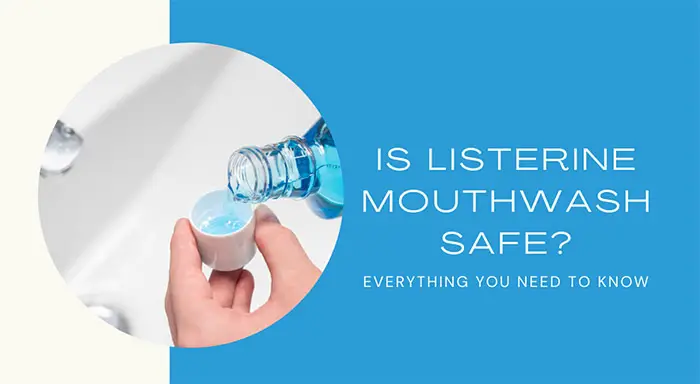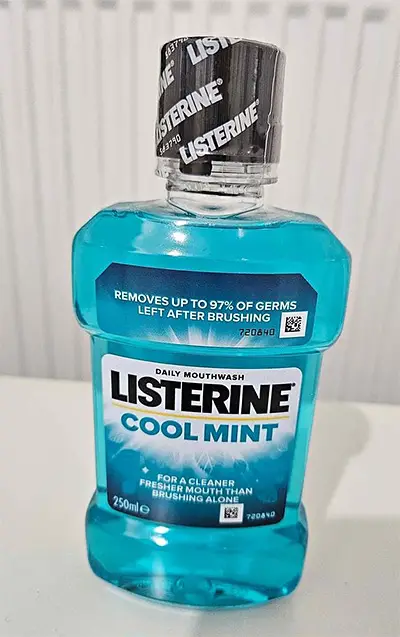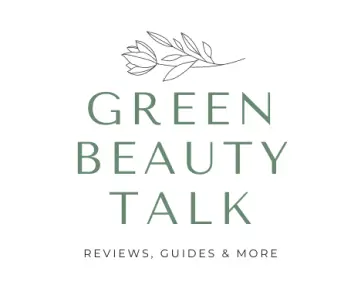
Listerine, one of the most popular mouthwashes on the market, has long been praised for its effectiveness in combating bad breath, which is how it originally gained its fame. But now, its main selling points include reducing plaque and strengthening teeth due to added fluoride.
However, this narrative is challenged by numerous dentists who are hesitant to recommend mouthwashes like Listerine, citing reasons such as potential harm to the oral microbiome and its high acidity, which could be detrimental to teeth.
So, this begs the question: Is Listerine good for you, or does it do more harm than good? In this article, I will delve into various research and expert opinions to offer a clear perspective on this topic.
Table of Contents
- What’s Really in Your Listerine?
- So, What Does Listerine Do?
- What About Side Effects?
- So, Is Listerine Bad for You?
- FAQs
What’s Really in Your Listerine?
Diving into the composition of Listerine, particularly the Essentials Cool Mint Mouthwash, reveals a concoction of various ingredients, each serving a unique purpose. Let’s break down the key components of this specific Listerine variant, which does not boast a whitening effect but includes alcohol:
- Aqua (Water): The primary base for most mouthwashes, providing a liquid medium for the other ingredients.
- Alcohol: Acts as an antiseptic to kill bacteria and other pathogens in the mouth. It’s also responsible for the strong, burning sensation often associated with mouthwashes.
- Sorbitol: A sweetener that enhances the taste, making the mouthwash more palatable without promoting tooth decay.
- Poloxamer 407: A surfactant that helps in dissolving the other ingredients uniformly in the solution.
- Benzoic Acid: Preserves the mouthwash by preventing the growth of microbes.
- Sodium Saccharin: Another sweetener, similar to sorbitol, used to improve taste.
- Eucalyptol, Methyl Salicylate, Thymol, Menthol: These are essential oils that contribute to Listerine’s distinctive taste and smell. They also have antiseptic properties.
- Sodium Benzoate: A preservative that extends the shelf life of the product.
- Aroma: This term usually covers a combination of flavoring agents that give Listerine its unique minty flavor.
- CI 42053 (Green dye): Gives the mouthwash its characteristic green color.
Among these ingredients, a few raise potential concerns:
- Alcohol: While effective as an antiseptic, alcohol in mouthwashes has been a topic of debate. It can cause dryness in the mouth, potentially leading to bad breath and irritation. Some studies suggest a link between high alcohol content in mouthwashes and oral cancer, although this connection is not definitively proven.
- Sodium Saccharin: A synthetic sweetener, it’s considered safe in small amounts but has been controversial due to animal studies linking it to bladder cancer, although such effects have not been proven in humans.
- CI 42053 (Green dye): Artificial dyes are often scrutinized for allergic reactions and other potential health risks. While they make the product visually appealing, they do not add any functional benefit to oral health.
In conclusion, while each ingredient in Listerine serves a purpose, ranging from antibacterial action to improving shelf life and taste, some of these components, particularly alcohol and artificial dyes, have raised health concerns. It’s important to weigh these factors when choosing a mouthwash.

So, What Does Listerine Do?
Listerine mouthwash, particularly the alcohol-containing variants, has been a subject of extensive research regarding its efficacy and safety. Here’s a summary of what the studies suggest about Listerine’s functionality and safety.
Efficacy:
- Listerine has been shown to be effective in improving oral health. It works primarily by killing bacteria and inhibiting their growth, thereby reducing dental plaque and gingivitis.
- Recent studies, as of 2022, have highlighted that using Listerine in addition to regular brushing and flossing can lead to a significant reduction in interproximal plaque. Specifically, it was observed that Listerine could reduce plaque by 28.4% more than just brushing and flossing alone. For those who don’t floss, using Listerine resulted in a 4.6 times greater reduction in plaque above the gumline compared to flossing done by a dental hygienist.
Safety:
- Concerning the safety of alcohol-containing mouthwashes like Listerine, various studies have been conducted to assess their link to oral cancer. The results from a series of reviews and meta-analyses have consistently indicated that there is no substantial evidence supporting a causal relationship between the use of alcohol-containing mouthwashes and an increased risk of oral cancer. These findings were based on the examination of several case-control studies.
The general consensus from these studies is that while Listerine is effective in enhancing oral health by reducing plaque and gingivitis, the concerns regarding its safety, especially in terms of its alcohol content and potential cancer risk, have not been supported by substantial epidemiological evidence.
However, it’s important to note that the absence of systematic toxicological studies means that a definitive safety assessment is challenging to establish. Therefore, while current data suggest that Listerine is safe for use, individuals with specific concerns or conditions should consult with their dental or healthcare provider for personalized advice.
What About Side Effects?
Listerine is well-known for fighting bad breath and its claims of reducing plaque and strengthening teeth. But, there’s another side to the story. Some dentists are skeptical about recommending it. Why? Let’s break it down in simple terms:
Impact on the Oral Microbiome
Mouthwash, including Listerine, can disrupt the oral microbiome. It’s effective at killing harmful bacteria, but it also eliminates beneficial bacteria, which are crucial for preventing the resurgence of harmful microbes. Some studies highlight this concern, noting that mouthwashes can kill a wide spectrum of bacteria in the mouth, including those in saliva.
Drying Effect
The alcohol content in Listerine can cause dryness in the oral tissues. This is particularly problematic for individuals already suffering from dry mouth. The drying effect can exacerbate discomfort and may lead to further oral health issues.
Burning Sensation
Many users report a burning sensation in the mouth and on the tongue when using Listerine. This is attributed to the combination of essential oils and alcohol in the formula. However, it’s worth noting that Listerine ZERO, an alcohol-free variant, offers a less intense experience.
Saliva and Teeth Erosion Concerns
Saliva is very important for your teeth as it acts like a natural mouthwash that keeps your teeth healthy by adding minerals back to them. But, some people say that using Listerine might make your mouth dry. Now, it’s not super clear why this happens. Maybe it’s the alcohol in it, maybe something else. In any case, decreased saliva production is not good for your teeth.
Also, there’s this worry that Listerine might be rough on your teeth. And indeed, one study highlighted concerns about the erosive effect of mouth rinses on dental enamel, showing significant dentin loss in some Listerine variants, which raises questions about their potential to contribute to tooth erosion.
Masking Bad Breath
Listerine might offer temporary relief from bad breath, but it may not address underlying issues such as halitosis. This is because it primarily masks the odour rather than eliminating the root cause.
Irritation and Mouth Ulcers
Some ingredients in Listerine can lead to irritation or worsen mouth ulcers for certain users. Alcohol, commonly found in mouthwashes, can dry out the mouth and may irritate sensitive tissues. Essential oils like eucalyptol, menthol, and thymol, known for their antibacterial properties, can also be harsh on the mouth, especially for those with sensitivities.
Additionally, artificial dyes and flavours in the mouthwash might trigger allergic reactions in some individuals. If you experience discomfort or worsening of mouth ulcers after using Listerine, consider switching to a gentler formula or seeking advice from a dental professional.
Additional Potential Side Effects
- Allergic Reactions: Certain individuals might be allergic to ingredients in mouthwash, leading to reactions like itching or swelling in the mouth.
- Staining of Teeth: Some mouthwashes, depending on their ingredients, can lead to staining of the teeth over time.
In summary, while Listerine and other similar mouthwashes have proven benefits, they come with a range of potential side effects, especially related to their impact on the oral microbiome, dryness, and irritation. It’s always advisable to consult with a dental professional to find the most suitable oral hygiene products for your specific needs and conditions.
So, Is Listerine Bad for You?
When it comes to Listerine, it’s not a simple yes or no answer. Sure, it’s great for killing bad breath germs and reducing plaque, but there’s more to it. Many dentists are concerned about its acidic nature. They say that over time, this acidity can wear down your tooth enamel, and that might even lead to cavities.
The bottom line? Listerine can be useful for some people, but it’s not for everyone. If you’ve got sensitive teeth or worries about enamel erosion, it might be better to skip it or go for a milder, non-acidic mouthwash. Always a good idea to check with your dentist to see what’s best for your teeth.
FAQs
Can Listerine Mouthwash Cause Cancer?
There’s been a lot of talk about whether alcohol-containing mouthwashes like Listerine can cause cancer. Research, including several studies and reviews, suggests that there’s no strong evidence linking these mouthwashes to an increased risk of oral cancer. However, if you’re concerned or have a history of oral health issues, it’s best to discuss this with your dentist.
Can Listerine Mouthwash Cure Oral Thrush?
Listerine might help in reducing the bacteria in your mouth, but it’s not a go-to treatment for oral thrush, which is a fungal infection. Typically, oral thrush needs antifungal medication for treatment. Using Listerine might provide some relief in terms of cleanliness, but it won’t cure the infection.
Is Using Listerine Everyday Bad for You?
Using Listerine daily isn’t necessarily bad for everyone, but it depends on your oral health condition. If you have sensitive teeth or concerns about enamel erosion, using it every day might not be the best idea. On the other hand, if you’re looking for plaque control and fresh breath, daily use might be beneficial. Again, your dentist can give the best advice here.
Does Listerine Mouthwash Contain Xylitol?
Not all Listerine products contain xylitol. Xylitol is often used as a sweetener in oral care products, but it’s important to check the specific ingredient list of the Listerine variant you’re considering, as formulations differ.
Listerine Mouthwash vs Flossing
Listerine and flossing serve different purposes in oral hygiene. While Listerine can kill bacteria and reduce plaque, it can’t remove food particles and plaque from between teeth like flossing can. Ideally, a combination of both is best for optimal oral health. Using Listerine can complement flossing but shouldn’t replace it.

